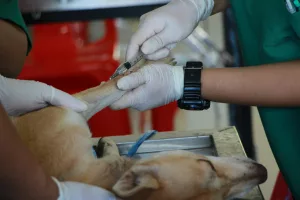Ferrets are playful and curious creatures known for their inquisitive nature and energetic behavior. However, if you notice your ferret drooling excessively while engaging in play, it could be a cause for concern. Excessive drooling in ferrets can indicate various underlying health or behavioral issues that need to be addressed. One of the common reasons for excessive drooling in ferrets is dental problems. Ferrets can develop dental issues such as gum disease, tooth decay, or abscesses, which can lead to drooling. Another possible cause is respiratory infections, which can result in nasal discharge that may be mistaken for drooling. Additionally, certain gastrointestinal issues such as nausea, stomach upset, or ingestion of toxic substances can also trigger excessive drooling in ferrets. It is essential to monitor your ferret’s overall health and behavior to determine the root cause of the drooling.
Understanding Ferret Behavior and Health
Ferrets, like many pets, have unique ways of expressing discomfort or illness. Understanding their normal behavior can help you spot when something is amiss. Typically, ferrets are active and playful, often exploring their environment with curiosity. They have a high metabolism and require a lot of playtime and interaction to stay healthy and happy. When a ferret deviates from this behavior, it can be an early indicator of stress, illness, or discomfort.
Key Behavioral Indicators
- Playfulness: Ferrets are naturally playful, often engaging in activities such as running, chasing, and burrowing. A drop in activity levels can suggest problems.
- Eating Habits: Changes in appetite can be a red flag. Ferrets should eat regularly, and any sudden reduction in food intake should be noted.
- Grooming and Hygiene: Ferrets generally keep themselves clean. Excessive drooling can interfere with their grooming habits, leading to a less-kept appearance.
- Social Interaction: Ferrets are social animals. Withdrawal from social interaction can suggest that something is wrong.
Possible Causes of Excessive Drooling in Ferrets
Dental Problems
Dental health is crucial for ferrets, and problems in this area are a common cause of drooling. Just like humans, ferrets can suffer from dental diseases that lead to significant discomfort and drooling.
- Gum Disease: Also known as periodontal disease, this occurs when plaque builds up on the teeth, leading to inflammation and infection of the gums.
- Tooth Decay: Ferrets can also suffer from cavities and tooth decay, which can cause pain and drooling.
- Abscesses: Dental abscesses are infections that can form at the root of a tooth, leading to swelling, pain, and drooling.
Preventive Measures:
- Regularly check your ferret’s teeth for signs of decay or disease.
- Provide dental treats or toys that help clean teeth.
- Schedule regular dental check-ups with your vet.
Respiratory Infections
Respiratory infections can cause a range of symptoms, including drooling. These infections can be viral or bacterial.
- Symptoms: Sneezing, coughing, nasal discharge, and lethargy are common indicators.
- Causes: Poor air quality, exposure to other sick animals, or underlying health conditions can contribute to respiratory issues.
Preventive Measures:
- Ensure your ferret’s living environment is clean and free from drafts.
- Avoid exposing your ferret to sick animals.
- Maintain good hygiene and air quality in their habitat.
Gastrointestinal Issues
Digestive problems can also manifest as drooling. Ferrets have sensitive digestive systems and can easily suffer from issues if their diet is not well-balanced.
- Nausea and Stomach Upset: These can be caused by dietary indiscretions, food allergies, or infections.
- Toxic Ingestion: Ferrets are curious by nature and may ingest harmful substances, leading to gastrointestinal distress.
Preventive Measures:
- Feed your ferret a high-quality, balanced diet appropriate for their age and health status.
- Keep toxic substances, including certain plants and household chemicals, out of reach.
- Monitor your ferret for any signs of digestive distress.
Behavioral Reasons for Excessive Drooling
Sometimes, ferrets may drool excessively due to excitement or overstimulation during play. Playing with toys or interacting with other pets can trigger a heightened state of arousal in ferrets, leading to increased salivation. This drooling is temporary and usually subsides once the ferret calms down.
Managing Overstimulation:
- Structured Playtime: Organize play sessions to prevent overstimulation. Use a variety of toys to engage your ferret’s interest without overwhelming them.
- Break Periods: Introduce short breaks during playtime to allow your ferret to calm down.
- Safe Environment: Ensure that your ferret’s play area is safe and free from hazards that could cause stress or injury.
Health Issues Associated with Excessive Drooling
Excessive drooling in ferrets can be a sign of serious health conditions such as dental disease, gastrointestinal disorders, or respiratory infections. If left untreated, these underlying issues can worsen and impact your ferret’s overall well-being. Regular vet check-ups and prompt medical intervention are essential to address any health concerns in your ferret.
Diagnostic Process and Treatment
When you observe excessive drooling in your ferret, it is advisable to consult a veterinarian for a thorough examination.
Steps in the Diagnostic Process:
- Physical Examination: The vet will check your ferret’s mouth, teeth, and gums for any obvious signs of dental problems.
- Blood Tests: These can help identify underlying infections or systemic issues affecting your ferret’s health.
- Dental X-rays: If dental issues are suspected, X-rays can provide a clearer picture of any problems below the gum line.
Treatment Options:
- Dental Procedures: Cleaning, extractions, or treatment of abscesses may be necessary.
- Medication: Antibiotics or pain relief might be prescribed depending on the diagnosis.
- Dietary Changes: Adjustments to your ferret’s diet may be recommended to manage gastrointestinal issues.
Preventive Measures and Tips
Prevention is always better than cure. By taking proactive steps, you can reduce the risk of excessive drooling and other health issues in your ferret.
Balanced Diet
Providing a balanced diet is crucial for maintaining your ferret’s health. Ferrets are obligate carnivores, meaning they require a diet high in animal protein and fat.
- High-Quality Food: Choose commercial ferret foods specifically formulated to meet their dietary needs.
- Fresh Water: Always ensure that your ferret has access to fresh, clean water.
- Avoid Human Food: Many human foods can be harmful to ferrets. Stick to ferret-safe treats and meals.
Regular Dental Care
- Dental Check-Ups: Schedule regular dental exams with your vet to catch any potential issues early.
- Dental Toys and Treats: Provide toys and treats that help clean your ferret’s teeth naturally.
Clean Living Environment
Maintaining a clean and safe environment is essential for your ferret’s health.
- Cage Hygiene: Clean your ferret’s cage regularly to prevent the buildup of bacteria and odor.
- Safe Space: Ensure that the living area is free from hazards and that your ferret has plenty of room to play and explore.
Monitor Playtime and Interactions
- Supervised Play: Always supervise your ferret during playtime to prevent accidents and overstimulation.
- Variety of Toys: Rotate toys regularly to keep your ferret engaged and prevent boredom.
Conclusion
Excessive drooling in ferrets while playing can be a red flag indicating potential health issues or behavioral concerns. By understanding the causes and seeking timely veterinary care, you can ensure the well-being of your furry companion and address any underlying issues effectively. Regular observation and preventive care go a long way in maintaining your ferret’s health and happiness. With the right approach, you can enjoy many playful and healthy years with your ferret.



